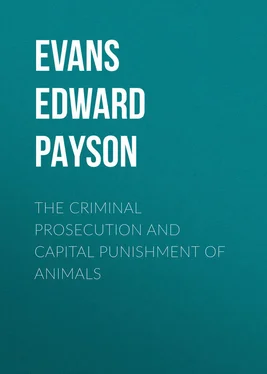Edward Evans - The Criminal Prosecution and Capital Punishment of Animals
Здесь есть возможность читать онлайн «Edward Evans - The Criminal Prosecution and Capital Punishment of Animals» — ознакомительный отрывок электронной книги совершенно бесплатно, а после прочтения отрывка купить полную версию. В некоторых случаях можно слушать аудио, скачать через торрент в формате fb2 и присутствует краткое содержание. Жанр: foreign_antique, foreign_prose, на английском языке. Описание произведения, (предисловие) а так же отзывы посетителей доступны на портале библиотеки ЛибКат.
- Название:The Criminal Prosecution and Capital Punishment of Animals
- Автор:
- Жанр:
- Год:неизвестен
- ISBN:нет данных
- Рейтинг книги:5 / 5. Голосов: 1
-
Избранное:Добавить в избранное
- Отзывы:
-
Ваша оценка:
- 100
- 1
- 2
- 3
- 4
- 5
The Criminal Prosecution and Capital Punishment of Animals: краткое содержание, описание и аннотация
Предлагаем к чтению аннотацию, описание, краткое содержание или предисловие (зависит от того, что написал сам автор книги «The Criminal Prosecution and Capital Punishment of Animals»). Если вы не нашли необходимую информацию о книге — напишите в комментариях, мы постараемся отыскать её.
The Criminal Prosecution and Capital Punishment of Animals — читать онлайн ознакомительный отрывок
Ниже представлен текст книги, разбитый по страницам. Система сохранения места последней прочитанной страницы, позволяет с удобством читать онлайн бесплатно книгу «The Criminal Prosecution and Capital Punishment of Animals», без необходимости каждый раз заново искать на чём Вы остановились. Поставьте закладку, и сможете в любой момент перейти на страницу, на которой закончили чтение.
Интервал:
Закладка:
The archives of the old episcopal city of St. Jean-de-Maurienne contain the original records of legal proceedings instituted against some insects, which had ravaged the vineyards of St. Julien, a hamlet situated on the route over Mt. Cenis and famous for the excellence of its vintage. The defendants in this case were a species of greenish weevil (charançon) known to entomologists as rychites auratus , and called by different names, amblevin, bèche, verpillion, in different provinces of France.
Complaint was first made by the wine-growers of St. Julien in 1545 before François Bonnivard, doctor of laws. The procurator Pierre Falcon and the advocate Claude Morel defended the insects, and Pierre Ducol appeared for the plaintiffs. After the presentation and discussion of the case by both parties, the official, instead of passing sentence, issued a proclamation, dated the 8th of May, 1546, recommending public prayers and beginning with the following characteristic preamble: “Inasmuch as God, the supreme author of all that exists, hath ordained that the earth should bring forth fruits and herbs ( animas vegetativas ), not solely for the sustenance of rational human beings, but likewise for the preservation and support of insects, which fly about on the surface of the soil, therefore it would be unbecoming to proceed with rashness and precipitance against the animals now actually accused and indicted; on the contrary, it would be more fitting for us to have recourse to the mercy of heaven and to implore pardon for our sins.” Then follow instructions as to the manner in which the public prayers are to be conducted in order to propitiate the divine wrath. The people are admonished to turn to the Lord with pure and undivided hearts ( ex toto et puro corde ), to repent of their sins with unfeigned contrition, and to resolve to live henceforth justly and charitably, and above all to pay tithes. High mass is to be celebrated on three consecutive days, namely on May 20th, 21st, and 22nd, and the host to be borne in solemn procession with songs and supplications round the vineyards. The first mass is to be said in honour of the Holy Spirit, the second in honour of the Blessed Virgin, and the third in honour of the tutelar saint of the parish. At least two persons of each household are required to take part in these religious exercises. A procès-verbal , signed by the curate Romanet, attests that this programme was fully carried out and that the insects soon afterwards disappeared.
About thirty years later, however, the scourge was renewed and the destructive insects were actually brought to trial. The proceedings are recorded on twenty-nine folia and entitled: De actis scindicorum communitatis Sancti Julliani agentium contra animalia bruta ad formam muscarum volantia coloris viridis communi voce appellata verpillions seu amblevins . The documents, which are still preserved in the archives of St. Julien, were communicated by M. Victor Dalbane, secretary of the commune, to M. Léon Ménebréa, who printed them in the appendix to his volume: De l’origine de la forme et de l’esprit des jugements rendus au moyen-âge contre les animaux . Chambery, 1846. This treatise appeared originally in the twelfth tome of the Mémoires de la Société Royale Académique de Savoie .
It may be proper to add that Ménebréa’s theory of “the spirit, in which these judgments against animals were given,” is wholly untenable. He maintains that “these procedures formed originally only a kind of symbol intended to revive the sentiment of justice among the masses of the people, who knew of no right except might and of no law except that of intimidation and violence. In the Middle Ages, when disorder reigned supreme, when the weak remained without support and without redress against the strong, and property was exposed to all sorts of attacks and all forms of ravage and rapine, there was something indescribably beautiful in the thought of assimilating the insect of the field to the masterpiece of creation and putting them on an equality before the law. If man should be taught to respect the home of the worm, how much more ought he to regard that of his fellow-man and learn to rule in equity.”
This explanation is very fine in sentiment, but expresses a modern, and not a mediæval way of thinking. The penal prosecution of animals, which prevailed during the Middle Ages, was by no means peculiar to that period, but has been frequently practised by primitive peoples and savage tribes; neither was it designed to inculcate any such moral lesson as is here suggested, nor did it produce any such desirable result. So far from originating in a delicate and sensitive sense of justice, it was, as will be more fully shown hereafter, the outcome of an extremely crude, obtuse, and barbaric sense of justice. It was the product of a social state, in which dense ignorance was governed by brute force, and is not to be considered as a reaction and protest against club-law, which it really tended to foster by making a travesty of the administration of justice and thus turning it into ridicule. It was also in the interest of ecclesiastical dignities to keep up this parody and perversion of a sacred and fundamental institute of civil society, since it strengthened their influence and extended their authority by subjecting even the caterpillar and the canker-worm to their dominion and control.
But to return to the records of the trial. On the 13th of April, 1587, the case was laid before “his most reverend lordship, the prince-bishop of Maurienne, or the reverend lord his vicar-general and official” by the syndics and procurators, François Amenet and Petremand Bertrand, who, in the name of the inhabitants of St. Julien, presented the following statement and petition: “Formerly by virtue of divine services and earnest supplications the scourge and inordinate fury of the aforesaid animals did cease; now they have resumed their depredations and are doing incalculable injury. If the sins of men are the cause of this evil, it behoveth the representatives of Christ on earth to prescribe such measures as may be appropriate to appease the divine wrath. Wherefore we the afore-mentioned syndics, François Amenet and Petremand Bertrand, do appear anew ( ex integro ) and beseech the official, first, to appoint another procurator and advocate for the insects in place of the deceased Pierre Falcon and Claude Morel, and secondly, to visit the grounds and observe the damage, and then to proceed with the excommunication.”
In compliance with this request, the distinguished Antoine Filliol was appointed procurator for the insects, with a moderate fee ( salario moderato ), and Pierre Rembaud their advocate. The parties appeared before the official on the 30th day of May and the case was adjourned to the 6th of June, when the advocate, Pierre Rembaud, presented his answer to the declaration of the plaintiffs, showing that their action is not maintainable and that they should be nonsuited. After approving of the course pursued by his predecessor in office, he affirms that his clients have kept within their right and not rendered themselves liable to excommunication, since, as we read in the sacred book of Genesis, the lower animals were created before man, and God said to them: Let the earth bring forth the living creature after his kind, cattle and creeping thing, and beast of the earth after his kind; and he blessed them saying, Be fruitful and multiply and fill the waters of the seas, and let fowl multiply in the earth. Now the Creator would not have given this command, had he not intended that these creatures should have suitable and sufficient means of support; indeed, he has expressly stated that to every thing that creepeth upon the earth every green herb has been given for meat. It is therefore evident that the accused, in taking up their abode in the vines of the plaintiffs, are only exercising a legitimate right conferred upon them at the time of their creation. Furthermore, it is absurd and unreasonable to invoke the power of civil and canonical law against brute beasts, which are subject only to natural law and the impulses of instinct. The argument urged by the counsel for the plaintiffs, that the lower animals are made subject to man, he dismisses as neither true in fact nor pertinent to the present case. He suggests that the complainants, instead of instituting judicial proceedings, would do better to entreat the mercy of heaven and to imitate the Ninevites, who, when they heard the warning voice of the prophet Jonah, proclaimed a fast and put on sackcloth. In conclusion, he demands that the petition of the plaintiffs be dismissed, the monitorium revoked and annulled, and all further proceedings stayed, to which end the gracious office of the judge is humbly implored ( humiliter implorato benigno officio judicis ).
Читать дальшеИнтервал:
Закладка:
Похожие книги на «The Criminal Prosecution and Capital Punishment of Animals»
Представляем Вашему вниманию похожие книги на «The Criminal Prosecution and Capital Punishment of Animals» списком для выбора. Мы отобрали схожую по названию и смыслу литературу в надежде предоставить читателям больше вариантов отыскать новые, интересные, ещё непрочитанные произведения.
Обсуждение, отзывы о книге «The Criminal Prosecution and Capital Punishment of Animals» и просто собственные мнения читателей. Оставьте ваши комментарии, напишите, что Вы думаете о произведении, его смысле или главных героях. Укажите что конкретно понравилось, а что нет, и почему Вы так считаете.












